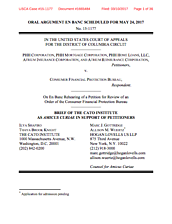Learn more about Cato’s Amicus Briefs Program.
The Consumer Financial Protection Bureau (CFPB), has been controversial for many reasons but its most troubling feature may simply be its unconstitutional structure. Its sole director reports to no one but himself, and, under the terms of Dodd-Frank, can be removed by the President only for cause. And it receives its funding not through Congress, but through the Federal Reserve. Not even the Fed has the authority to challenge its spending, however. Instead, the law says the Fed “shall” give the CFPB the funds it requests, up to 12 percent of the Fed’s total operating expenses. As of 2015, that meant the CFPB could demand up to $443 million in one year.
Today, Cato filed an amicus brief in PHH v. CFPB, challenging just this unconstitutional structure. In it, Cato argues that the CFPB poses a threat to liberty in two ways. First, by violating core principles of separation of powers. Second, by existing unfettered by any accountability to the people, either through direct election or through control by an elected office.
The constitutional problems would be reason enough to fear the CFPB, but these problems are not merely academic. The way Director Cordray has wielded his considerable authority demonstrates just how important these checks are. In the case of PHH, not only did the company suffer from prosecution by an unconstitutionally structured agency, it suffered clear violations of due process. After PHH appealed a ruling by one of the CFPB’s in-house judges (for further discussion of the problems with such in-house judges, see our filing in Lucia v. SEC), Director Cordray not only applied a brand-new interpretation of a relevant regulation without first providing notice of the new interpretation, he applied that new understanding retroactively to earlier conduct, and based on this retroactive application, increased 18-fold the penalty already assessed by the in-house judge, resulting in a penalty of $109 million.
We hope that the D.C. Circuit will uphold the earlier finding that the CFPB exists in clear violation of the constitution and that the people have a right to be free of such tyranny.

This work is licensed under a Creative Commons Attribution-NonCommercial-ShareAlike 4.0 International License.
